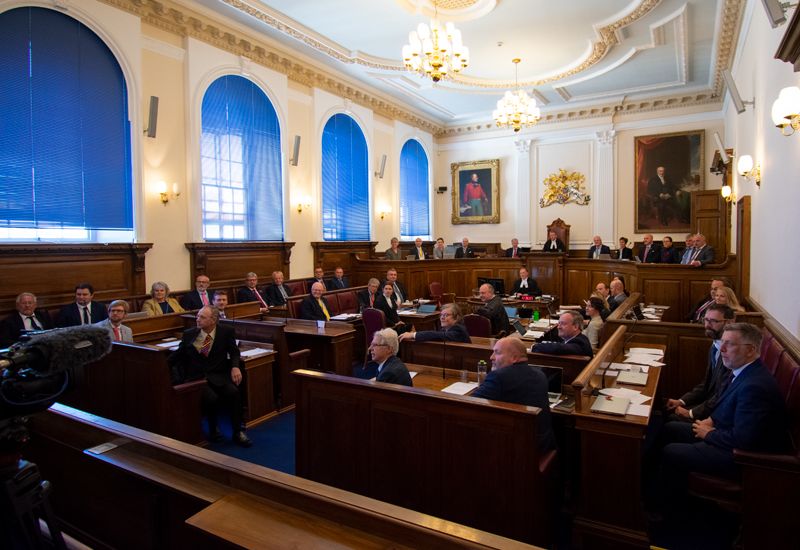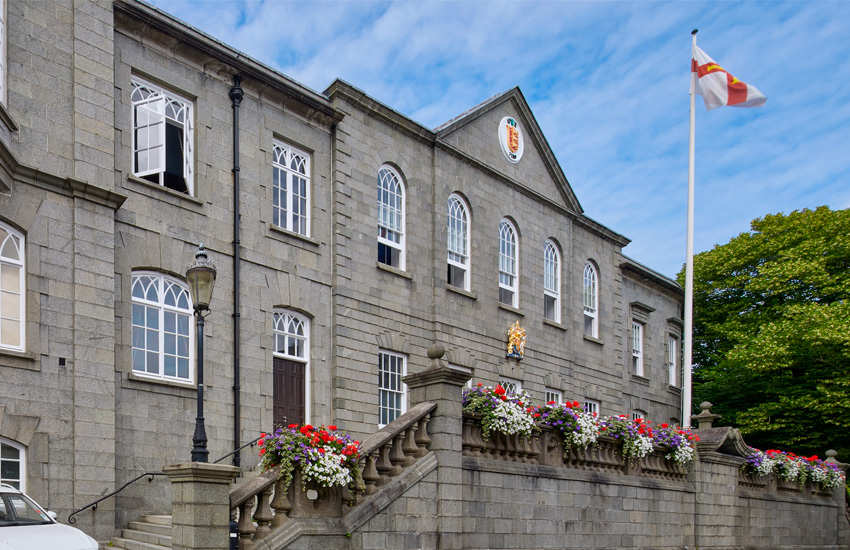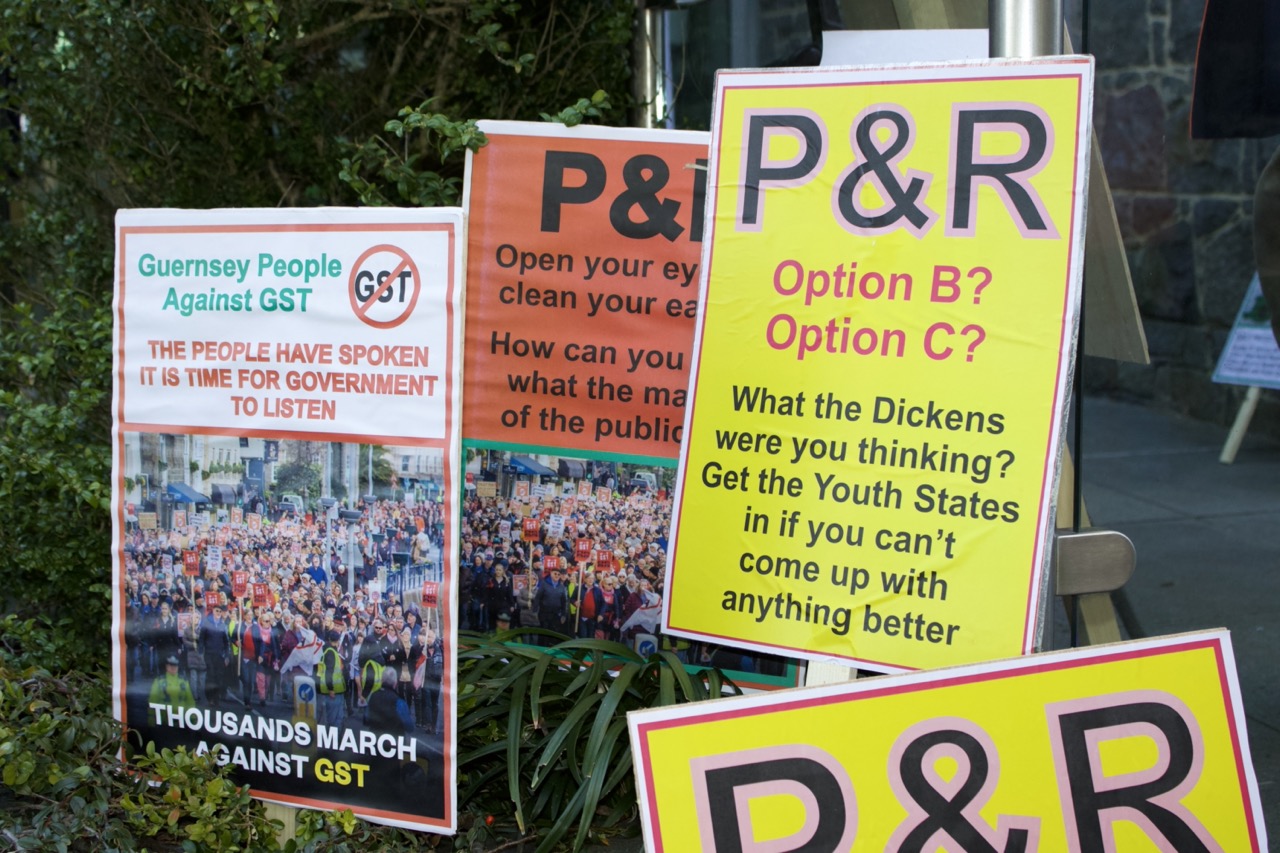


With one year to go until the next election Express has asked the incumbents if they plan to put their name on the ballot paper and to reflect on the term so far.
21 out of 38 People’s Deputies responded to questions from Express.
Health & Social Care President, Deputy Al Brouard will be standing down in 2025 after five full terms in the States.
He said: “I have been very honoured to serve as a States member for over twenty years."
It’s already been reported that the Policy & Resources President, Deputy Lyndon Trott, and Deputy Peter Roffey, President of both Employment & Social Security and the States Trading Supervisory Board, won’t be standing either.
The Education, Sport & Culture President, Deputy Andrea Dudley-Owen, has revealed she’s undecided and needs to take stock in light of her health challenges.
“I am focused at this time on getting on with the work we have to do in the time remaining,” she said. “Having undergone a long period of treatment for breast cancer during this term I will need to consider my health, as a significant factor when I come to make any decisions on standing."
Deputy Lindsay de Sausmarez, President of Environment & Infrastructure, said she’s also undecided, and so too is Deputy Heidi Soulsby, the Vice-President of P&R.
Home Affairs President, Deputy Rob Prow will only consider re-standing next year: “There is a year left and I am currently working very hard on my portfolio of this term."
Deputy Victoria Oliver, President of the Development & Planning Authority, is “unsure”, while Scrutiny President, Deputy Yvonne Burford has confirmed she plans to stand.
Express didn’t receive responses from other committee Presidents – Deputies Neil Inder, Carl Meerveld, Chris Blin and David de Lisle.

Meanwhile, Deputies Adrian Gabriel, Simon Vermeulen, Andy Cameron, Nick Moakes, Aidan Matthews, Marc Leadbeater, Sue Aldwell, and John Gollop all said they intended or hoped to stand.
The latter two were less committed than the others.
“I have built up quite a library of knowledge, which I feel I could put to good use, if I was fortunate to be re-elected. On the other hand, I think probably my family would rather I did not stand,” Deputy Aldwell said.
Deputy Gollop said he wanted to put his name forward in 2025 “strength, energy, and health permitting”.
Deputies Chris Le Tissier, Simon Fairclough, Steve Falla, Sasha Kazantseva-Miller, and Gavin St Pier haven’t made a final decision on standing, or didn’t wish to say.
Invariably, most respondents viewed personal committee successes and helping members of the community as the best parts of the role over the past four years – while repeated moments of indecision, tribalism and the rehashing of decisions cited as low points.
The multiple tax review debates, failure to agree a future direction for the harbours, lack of progress on housing, and the manner of debate for the parliamentary privilege report and motion of no confidence in the top committee live long in their minds.
Deputy Prow had so much to say on the matter he said he was preparing an opinion piece to this end.
The outgoing Deputy Roffey said “there haven't been too many, but the States agreeing to secondary pensions stands out as a high point”.
But he criticised this cohort's “inability” to “make any big decisions - from the future of commercial ports, to future fiscal policy, to SLAWS”.
Deputy St Pier agreed: “This term’s legacy will be one of missed opportunity, the cost of which is far greater to the community than is generally realised."
Deputy Le Tissier said the high point was the rejection of GST. The low point for him was“ decisions coming back again and again by deputies who don't like the result of the vote. Decision made, move on”.
“The tribalism is the worst part,” Deputy Leadbeater said. “Constant bickering and attacking other members has marred this term - not that it wasn't present last term though."

Deputy Soulsby said a high point for P&R was created the Government Work Plan "that for the first-time matched policy development with resources and cleared over a hundred old resolutions and will help the new Assembly in hitting the ground running next term which will be essential".
But her resignation from the post in 2022 was a bad moment: “More generally, the tribalism that prevented decisions from being made. This was particularly disappointing in terms of the tax review where it was impossible to get to a consensus position and means difficult decisions will need to be made next term."
This was a common thread running through most responses.
“It was disappointing when personalities and factions appeared to feature too heavily in voting patterns rather than policies and issues being debated entirely on their merits,” Deputy Falla said. “I would say that this has happened less of late. The lowest point has been, despite acquiring sites for keyworker and social housing, our inability to see spades in the ground when it comes to providing more housing. The fruits of that will come next political term."
Deputy Gollop said: “The worst parts are challenging behaviors, a bit of partisan group dynamics, the angry GST debates, the vote of no confidence era and the privileges panel report debate - a real low point regardless of sides or outcome."
“The States debates on harbour redevelopment, not just in terms of the outcome but how it was conducted was a low point, as were debates on Privilege and the Motion of No Confidence in P&R. But we live and learn and move on,” added Deputy Fairclough.
“The unhealthy political dynamics that emanated from the formal and informal party groupings that came about after Island Wide Voting and the divisions that entailed. They created a lack of trust and a ‘us-and-them' dynamics,” Deputy Kazantseva-Miller said. “I enjoyed working with many members across the Assembly once those divisions started to break and cross-Assembly working improved."
Deputy Cameron said: “I find the tedious repetition of speeches during States Meetings quite frustrating. Implementing a mechanism to immediately address misleading speeches would be beneficial. Such repetition and misinformation damage our democratic process and has often led to unnecessary last-minute amendments. The backstabbing and contempt can also be alarming; with no one to report issues experienced. You need tough skin for this job."
For Deputy Oliver, the worst part was “having poo left of my door”, occurring just days after the DPA approved the housing application for Pointues Rocques.

“The worst part is when the States doesn’t listen to opposing views and chooses to plough ahead in a single direction, instead of trying to work towards an outcome that has broad support. Our Education approach was an example, ignoring opposition and cutting the promised review of options early,” Deputy Matthews said.
But Deputy Aldwell came to the defence of Education, saying: “I have had the opportunity to see the wonderful work which goes on in our schools, our teachers have done a phenomenal job coming out of covid, which is evidenced by the Ofsted reports. We should all be very proud of our school settings.
“The lowest part of this term has to be Education being used as a political football, letting our teachers and young people down. The lowest point was probably our Primary Headteachers feeling the need to make a statement to our local press to defend their schools, even though they had all done phenomenally well coming out of covid.”
Her high points were developing new policies for domestic abuse and sexual violence which will see tougher stances taken on perpetrators and new services created for victims, with more changes including the outlawing of non-fatal strangulation in the works.
Deputy de Sausmarez said: “High points as part of ESS have included the removal of a cruel policy that was keeping a number of Guernsey children in poverty, and the introduction of anti-discrimination legislation. High points at E&I have included the Electricity Strategy, which was strongly supported by the States and industry alike, all the work we’re doing to turn the tanker that is the island’s housing crisis, and the significant progress in transport, such as our modernising improvements to the bus and taxi services and the huge increases in walking and cycling."
Deputy Vermeulen viewed supporting the island through the second lockdown, “preparing for Moneyval, enabling proposal for a pool marina to be developed, and enabled small producers and distillers to benefit from local assistance, and in a different way representing Guernsey by meeting cruise liners who have come to Guernsey for the first time,” as highlights.

The nomination period for candidates wanting to stand in 2025 will open next spring – and despite the negatives reported above many respondents encouraged others to throw their hats into the political ring.
“I’ve learnt that there are three distinct roles that a Guernsey Deputy can play, that of legislator, approving legislation in our assembly and discussing and debating as you would expect the policy letters of the day, another aspect where there is significant workload is that in committee, creating policy and shaping those policy letters, ensuring policy is being carried out in an operational manner as expected,” Deputy Gabriel said.
“The other important matter is helping the community, there are various consistency type tasks, which range widely but are hugely rewarding.There are many other responsibilities too.”
“Something that flies below many people’s radar is the constituency work we do as a People’s Deputy – helping individuals and families – which can be very rewarding when you manage to directly make a positive difference to people’s lives,” Deputy de Sausmarez said.
Deputy Fairclough echoed that: “It’s an enormous privilege to represent the community and just taking part in the election is an education. The job is interesting, challenging and time-consuming. Often the most rewarding aspects involve constituency work – trying to help individuals and groups with issues and problems."
Deputy Cameron recalled: “Each week, we receive our meeting papers in advance, which often uncover fascinating elements of Guernsey that I was previously unaware of. You get to work with some great people who genuinely care about improving island life."
The next election will take place on 18 June 2025.
“My advice to anyone new thinking of standing is to speak personally to a selection of existing and previous deputies to find out about the role and responsibilities of being a deputy,” said Deputy Burford.
Comments
Comments on this story express the views of the commentator only, not Bailiwick Publishing. We are unable to guarantee the accuracy of any of those comments.